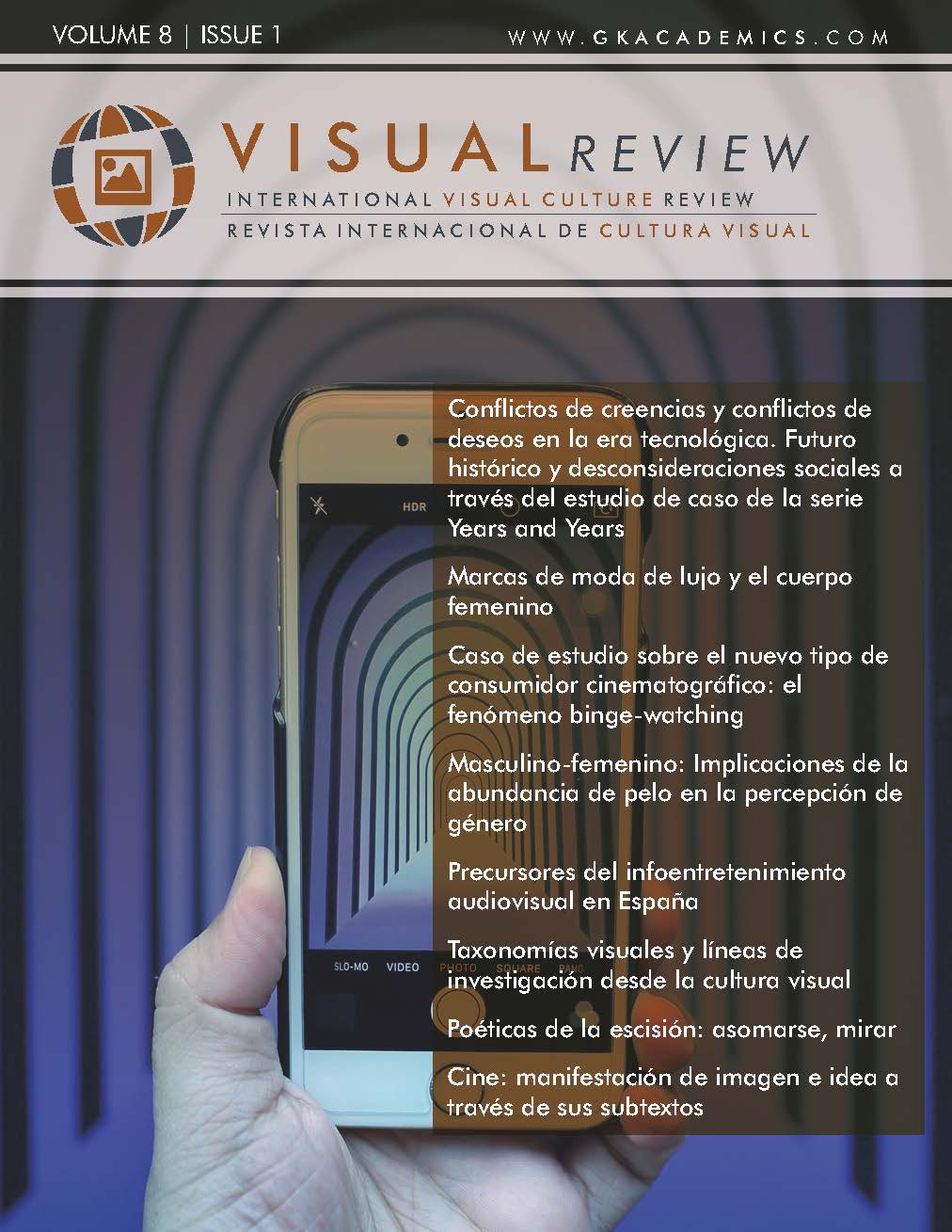Conflicts of Beliefs and Conflicts of Desires in the Technological Age. Historical Future and Social Disconsiderations Through the Case Study of Years And Years Series
DOI:
https://doi.org/10.37467/gka-revvisual.v8.2672Keywords:
dystopia, audiovisual communication, civic education, technology, politicsAbstract
This paper elaborates a reflection on the power of audiovisual production in the interpretations of the political, social and existential crises of our present time. For this, a hermeneutical work is done on the British television miniseries Years and Years created and written by Russel T. Davies for BBC and HBO, concentrating on the narrative breadth it contains to critically think about phenomena such as the end of history, the post-politics and transhumanism, thus hovering over the complexity of the technological age. A work that integrates the analytics of a dystopian future that extends in its fictional virtuality beyond entertainment on the unthinkable and closer to a reality to come.
Downloads
Global Statistics ℹ️
|
645
Views
|
226
Downloads
|
|
871
Total
|
|
References
Azaovagh de la Rosa, A. (2019). "Judith Butler y su precariedad metódica", en Bajo Palabra, Revista de Filosofía, ÉPOCA Nº II. Nº 22, pp. 147-170.
Bazin, A. (2012). ¿Qué es el cine? Madrid: Rialp.
Comolli, J. L. (2007). Ver y poder. Buenos Aires: Aurelia Rivera Editora.
Chacón, J. A.; Cavieres, E. y González, J. (2018). “El compromiso estudiantil ciudadano y su vínculo con el éxito educativo en la educación superior”. Opción. Revista de Ciencias Humanas y Sociales Opción, Año 34, Núm. 86: 393-422.
Dipaola, E. M. (2019). Producciones imaginales: lazo social y subjetovación en una sociedad entre imágenes. Arte, Individuo y Sociedad, 31(2), 311-325.
Enríquez, I. (2020). «Desinfovirus», retorno al futuro y reivindicación del conocimiento razonado: https://rebelion.org/desinfovirus-retorno-al-futuro-y-reivindicacion-del-conocimiento-razonado/
Frampton, D. (2006). Filmosophy: a Manifesto for a Radically New Way of Understanding Cinema. London & New York, Wallflower Press.
Francescutti, P. (2019). La narración audiovisual como documento. Empiria, 42, 137-16.
Autor (2019). Comunicación popular y práctica política Algunas aproximaciones hermenéuticas a “Himno nacional” (“National Anthem”) de Black Mirror. En El efecto Black Mirror: ensayos sobre filosofía, tecnología y cultura /Héctor Ariel Feruglio Ortiz... [et al. Editorial Teseo, Argenina.
Lanceros, P. (2017). El robo del futuro. Fronteras, miedos, crisis. Madrid: Catarata.
Luna, L. (2006). La insuficiencia del discurso racional. Madrid: Biblioteca Nueva.
Laclau, E. (2005). La razón populista. Fondo de Cultura Eco- nómica: Ciudad de México.
Mercier, C. (2019). Ficciones distópicas latinoamericanas: Elaboraciones esquizo-utópicas. Aisthesis, 65, 115-133.
Mieres, M. (2019). Identidad, itinerario y temporalidad en el reconocimiento de sí. Algunos aportes al campo educativo. Utopía y Praxis Latinoamericana, 24,n°EXTRA 4, pp.166-177.
Ruiz, F. J. (2017). El cine como modelo epistemológico. Tesis Doctoral.
Ruiz, F. J. (2017b). El cine como modelo imaginario en la industria cultural: a propósito de la mirada y la atención. Pasajes, 53, 132-149.
Autor (2018). “El lugar del individuo en la era post-postmoderna. Sociedad, educación y ciudadanía tras la postmodernidad”. Pensamiento, vol. 74, 282: 835-852
Autor (2019). “El sentido de la educación: del yo como antídoto a la globalización”, Cinta de Moebio: Revista Electrónica de Epistemología de Ciencias Sociales, 65: 254-266.
Reati, Fernando. Postales del porvenir. La literatura argentina de anticipación en la Argentina neoliberal (1985-1999). Buenos Aires, Biblos, 2006.
Rivera, N. (2006). “La razón desencantada: reflexiones weberianas sobre la racionalidad en las sociedades occidentales modernas”, en: R. Orsí (ed.), El desencanto como promesa. Fundamentación, alcance y límites de la razón práctica. Madrid: Biblioteca Nueva.
Scannone, J. C. (2009). Discernimiento filosófico de la acción y pasión históricas. Barcelona, Anthropos.
Vattimo, Gianni. “Utopía, contrautopía, ironía”. Ética de la interpretación. Barcelona, Paidós, 1991, p: 95-112.
Westwell, G. (2007). “Critical approaches to the history film-A field in a search of a methodology”, The Journal of Theory and Practice, Vol. 11, núm. 4, pp. 577-588
Zizek, S. (1994). ¡Goza tu síntoma! Jacques Lacan dentro y fuera de Hollywood. Buenos Aires, Nueva Visión.
Downloads
Published
How to Cite
Issue
Section
License
Those authors who publish in this journal accept the following terms:
-
Authors retain copyright.
-
Authors transfer to the journal the right of first publication. The journal also owns the publishing rights.
-
All published contents are governed by an Attribution-NoDerivatives 4.0 International License.
Access the informative version and legal text of the license. By virtue of this, third parties are allowed to use what is published as long as they mention the authorship of the work and the first publication in this journal. If you transform the material, you may not distribute the modified work. -
Authors may make other independent and additional contractual arrangements for non-exclusive distribution of the version of the article published in this journal (e.g., inclusion in an institutional repository or publication in a book) as long as they clearly indicate that the work was first published in this journal.
- Authors are allowed and recommended to publish their work on the Internet (for example on institutional and personal websites), following the publication of, and referencing the journal, as this could lead to constructive exchanges and a more extensive and quick circulation of published works (see The Effect of Open Access).














